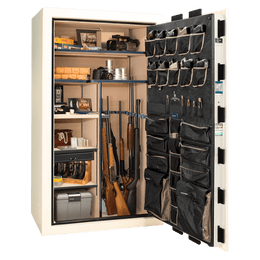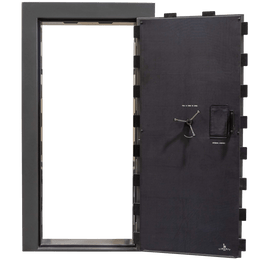Any firearm owner knows the importance of maintaining a supply of ammunition. After all, without ammunition, your firearm is nothing more than an expensive paperweight. Recent years have shown that ammo supplies can quickly dry up in times of social unrest, political uncertainty, or supply chain problems, and keeping a supply of ammo stored safely in your home can help alleviate those shortages and keep you happily hunting, shooting, and recreating with your firearms and family while others have to go without, or pay outrageous prices for high-demand ammunition.
In this article, we’re going to go over the reasons you should take safe ammo storage seriously and talk about some key factors to consider when developing your ammo storage strategy.
Reasons you should store your ammunition safely
From the outset, there are several good reasons for being mindful to store your ammunition safely. The main two reasons are to protect the ammo itself from damage and deterioration and to protect others. Let’s go into a bit more detail.
Protect your expensive ammunition from damage and deterioration
Proper storage in a cool, dry place is essential for most valuables, but especially ammunition. The price of ammo has gotten so high that some people have actually started buying extra in hopes of using it as a form of currency, potentially trading it for goods or services when ammo is in short supply. However, any ammo is only as good as it’s been stored. If your stockpile is corroded or damaged by heat, it’s no good to you or anyone else.
Keep ammunition out of the hands of children, thieves, and unauthorized people
Another primary reason for proper ammunition storage is to keep it out of the hands of children, other unauthorized people, and thieves. In some places, you could be held partially or fully liable if you haven’t taken reasonable precautions when storing firearms and ammunition, and they fall into the wrong hands. A good ammo storage strategy takes each of these factors into account.
Points to consider when storing ammo
Humidity
Humidity in the air, and especially direct liquid water exposure, can have devastating effects on ammunition. Quality ammo can be immersed in water without damage, as long as it’s quickly dried off afterward and returned to a dry, cool location. But ammunition that’s improperly stored in humid environments, or that has been subjected to flooding, a leaking roof, or another source of water contamination over any significant length of time will often be rendered worthless.
Note that the cardboard and/or foam packaging that many types of ammunition come packed in can also absorb water from the air, which can then react with the metals in the ammo to cause destructive corrosion. So, be sure to keep your ammo in a humidity-controlled, air-tight container, particularly if your home is not humidity controlled, or your local weather conditions are often humid.
High temperatures and heat cycling
Along with humidity, heat is the factor that will kill ammo the quickest. If you store your ammunition in the trunk of your car, for example, and it often gets hot where you live, the heat can damage the gunpowder and priming compounds inside the ammo and create the potential for dangerous overpressure when fired or render the gunpowder unreliable or inert.
Cycling between hot and cold environments frequently can accelerate ammo deterioration as well, so an unheated attic in the winter that gets hot in the summer (or a garage with similar conditions) is a terrible place for long-term ammo storage. Remember, you need to keep your ammunition cool and dry to preserve it for the maximum possible duration.
Fire resistance
When we talk about protecting ammunition from fire, it’s not because of any safety issues, but rather to protect your expensive ammunition from loss. Even if ammunition is burned in a fire, the danger presented by exploding cartridges is actually pretty minimal, since it’s the case, not the bullet, that may fly a short distance when the powder goes off. Sound wrong to you? Well, think about this: When a cartridge is contained within the chamber of a firearm, and the round is fired, the pressure is contained by the chamber, forcing the bullet down the barrel at high speed. However, when that cartridge is NOT contained in a chamber, by far the heaviest part of the cartridge is the bullet. So when the powder burns and the pressure builds up, the case ruptures, releasing the pressure, and perhaps launching part of the case a little way, but not with any real force. This may potentially damage an unprotected eyeball, but otherwise, there’s very little chance of serious harm being inflicted by any flying projectiles when ammunition burns.
Sporting Ammunition and the Fire Fighter:
What Happens When Ammo Burns?
However, keeping your hundreds or thousands of dollars of ammunition in a fire-resistant safe, vault room, or other fireproof storage area is a good idea, as long as it meets the other requirements for proper storage.
Ammo cans or other sealed containers
Military-type metal or plastic ammo cans are not only convenient for carrying your ammo to the range, but if properly designed, they are also waterproof, or at least effectively sealed to the outside air. This is extremely important to prevent humidity damage, as noted above. Ammo cans can be a great way to keep your ammo organized, stacked, and dry. However, ammo cans are not the only way to do so.
Tupperware-type containers, plastic food-storage buckets, and gallon zip-top bags can be excellent and inexpensive ways to keep your ammunition sealed away from moisture.
Adding a couple of inexpensive silica gel desiccant packs to each container or ammo can is another hedge against invasive humidity, and is a good idea, especially for long-term ammo storage.
Accurate labeling
We said above that the cardboard or foam factory ammo packaging can potentially absorb water from the air, but we still recommend ammo be stored in its factory packaging where possible (inside a larger, airtight container, of course), and not just because it makes it easier to organize and store. The labels of most ammo packaging contain all the relevant information you need to identify the type of ammo, the bullet weight, and other information. If you don’t want to keep the factory boxes, at least tear off the end label and include it with the loose ammo in the sealed container of your choice, so you or your family will be able to identify the ammunition when needed.
If you wish to store hand-loaded or reloaded ammo, be sure to clearly label whatever containers you use, and it’s always a good idea to include a printed or written card inside the container as well to remind yourself what the load is composed of. Trust us… you won’t remember, even if right now you’re sure you will. Write it down and include that information in every container.
How long can ammo be stored?
Gunpowder contains volatile chemicals and oxidizers that are held in a stable, granular form, but powder and primers will still degrade over time, especially when subjected to heat and humidity, as noted above. Even properly stored ammunition has been known to corrode through its steel or brass casings as the off-gassing of some powders takes place over time. Most high-quality modern ammunition is loaded with non-corrosive powders and primers, and when properly stored, should last decades without meaningful deterioration. However, it’s a good idea to check a sample of your supply once or twice a year to see if there are any indications of moisture, corrosion, or off-gassing.
If you find any of your brass cases exhibit pink staining, pinholes, green verdigris, or other corrosion, dispose of that ammo immediately and double-check your storage containers and methods. Don’t use corroded ammo. It’s not worth the risk.
How much ammo can you keep in one storage spot?
Local ordinances may dictate a limit on how many rounds of ammunition may be legally stored in a residence, but in most places in the US, there’s no formal recommendation or limit. However, it’s your responsibility to learn and follow your local laws. There may be different rules within the same state, depending on what city you live in, so make sure you check.
For example, there may be a local law requiring you to keep your firearms and any ammunition securely locked up. There may be a local ordinance limiting the number of rounds of ammo you can legally store in your place of residence. If you rent a home or apartment, you may also be subject to a renter’s agreement that may dictate how and where you must store your firearms and ammunition or may prohibit such items entirely. This also may apply to home/fire insurance policies, so read your documents carefully. Please observe and follow all local laws regarding the manner of storage, and any limits on the amount of ammo you can store. If you don’t like your local laws, work to change them.
Best places to store ammo safely
As we’ve discussed above, the best place to safely store ammunition, as far as preventing damage and deterioration are concerned, is in a cool, temperature-stable, dry place with little or no chance of any contact with flooding or leaks from broken pipes. Ammo should be stored in airtight containers and labeled clearly. Never store ammunition in your vehicle long-term, or anywhere it could be exposed to heat cycling or humidity.
Most people recommend storing firearms and ammunition in separate, secure locations. This is to prevent the possibility of thieves, kids, or other unauthorized people getting access to both your firearms and ammunition. This is a decision that you must make for yourself, but it’s a good idea. Some people keep one safe for their guns, and one for their ammo.
Store your ammo in a Liberty Safe
If you decide to store your ammunition inside a fire-resistant safe, Liberty can help. We have a full line of home and gun safes of all sizes and capacities and in multiple configurations and colors. Have a look at our online catalog or use our handy dealer locator to find a showroom near you
*Made in the U.S.A. from U.S. and Global Parts.







